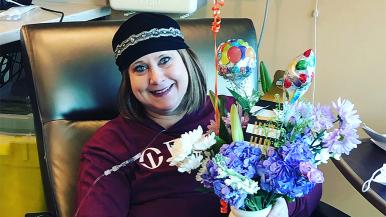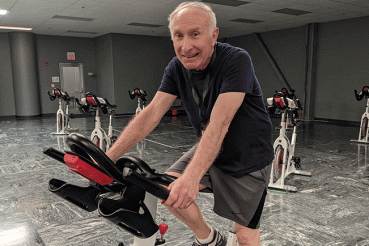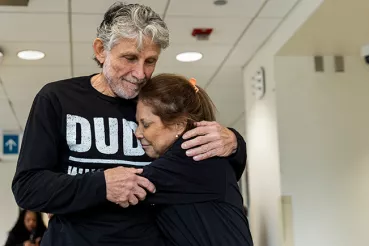Oncology social worker Laura Rollins, LSW, knows what it’s like to receive a cancer diagnosis. She was successfully treated for breast cancer in 1997. So, nine years ago, when she saw the opening for an oncology social worker in Rush Copley’s Cancer Care Center, she jumped at the chance to support cancer patients through their diagnosis and treatment.
“It was my dream job,” the cancer survivor says. Little did she know she would become a patient again — this time in her own department — and that her colleagues and patients would help her through.
As oncology social worker in the center, it is Laura’s job to walk patients through their treatment journeys, providing emotional support and resources. Providers at the cancer center screen patients for anxiety, depression and other psychosocial needs, and also for concrete needs, including food and housing. Laura provides the help patients need, researching available resources and assisting as they apply for financial aid programs or navigate Family Medical Leave.
As a cancer survivor, Laura already had a pretty good understanding of what her patients go through. But her new gynecological cancer diagnosis last year left her feeling even more of a kinship with patients, especially those who have more aggressive forms of cancer.
Living with uncertainty
“When I had breast cancer in 1997, there was a 97% chance I would survive,” she says. This time, Laura had a rare and very aggressive form of cancer that has high rates of recurrence and a poor prognosis.
With this new diagnosis, Laura says she experienced shock and fear and learned firsthand what it’s like for people who are living with this uncertainty.
“I have today,” she says. “That might be all we have.”
After Laura was diagnosed, Ellen Embry, MD, a gynecologist with Rush Copley Medical Group, referred her to Andras Ladanyi, MD, a specialist in gynecologic oncology at Rush University Medical Center.
Laura’s treatment started with Ladanyi performing robotic surgery to remove the cancer at Rush University Medical Center in Chicago. The rest of her treatment was at Rush Copley’s Cancer Care Center. She had six rounds of chemotherapy under the direction of medical oncologist Kaushik Patel, MD, and 28 radiation treatments under the direction of radiation oncologist Ying Zhang, MD, both with Rush Copley Medical Group.
“Combined with the expertise of specialist Dr. Ladanyi, we delivered the most cutting-edge treatments,” Zhang says.
Specialists collaborate
Laura’s multidisciplinary care team worked together to coordinate her complex treatment, maintaining constant communication from Laura’s diagnosis throughout each step of her treatment regimen.
“Being connected through the Rush System made it easy for each of us to access her records,” Patel says, “and patients benefit from the ease of scheduling visits that being in one system allows.”
The teams have excellent working relationships, Ladanyi adds, enabling them to coordinate treatment and follow-ups smoothly.
Juggling treatment with work
Working in the Cancer Care Center, Laura felt extremely prepared for what she would be experiencing. She took a 12-week leave from work after her surgery, then returned to her job at the center and worked through her six months of chemotherapy and radiation treatments.
“I was pleasantly surprised I did as well as I did,” she says.
Ladanyi was impressed by Laura’s dedication and compassion. “Despite the intensive treatment she received, Laura was very eager to go back to work helping other cancer patients at Rush Copley,” Ladanyi says. "She is truly an incredible person.”
Laura also gained strength and courage from her patients and the examples they set.
“They inspire me,” she says. “I’ve always admired our patients for their attitudes and strength. Many don’t have a choice — they have to work through treatment.”
Like those patients, Laura supports herself and felt she had to work. But there was another reason she was glad to come to work every day: the support she received from co-workers. “This place has carried me through,” she says.
Overwhelming support
When she was first diagnosed, Laura was very open about it with her colleagues. “It was heartwarming to see how much the staff rallied around her,” says Jennifer Lerner, MSN, RN, OCN, clinical nurse manager at the center. “It made me so proud.”
Because they knew that she would need time off from work following her surgery, the staff and providers chipped in to raise more than $3,000 for Laura, allowing her to take time off to recover without worries about paying bills.
“It was amazing, overwhelming and so kind,” Laura says.
The staff brought her meals and sent her weekly cards with words of encouragement and, sometimes, gift cards or lottery tickets.
“I felt so supported,” Laura says. “They sent cards that said, ‘Open on your first chemo’ or ‘Open when you’re feeling down.’ I followed the instructions. They were so creative and nice to receive. It was really fun.”
Her colleagues also made T-shirts, which they wore every time Laura came in for treatment. On the front, the shirts simply say “Cancer Center” and the back says, “We’re on your team!” and features an orange-peach ribbon signifying gynecologic cancer. While T-shirts are not the usual attire in the Cancer Care Center, the staff received special permission to wear them on Laura’s treatment days.
“Laura has been an invaluable and beloved member of our cancer care team,” Zhang says. “The fact that she entrusted her cancer care to us is not only an honor but also a testament to the pride and confidence all members of our team have in working at Rush Copley.
“To assess the quality of care provided by a center, you need to answer the question, ‘If your family member or close friend were to have cancer, would you want them to be treated here?’ At Rush Copley, the answer is a resounding ‘yes.’”
Laura agrees and says, “If I have to go through treatment, this is where I want to be.”




